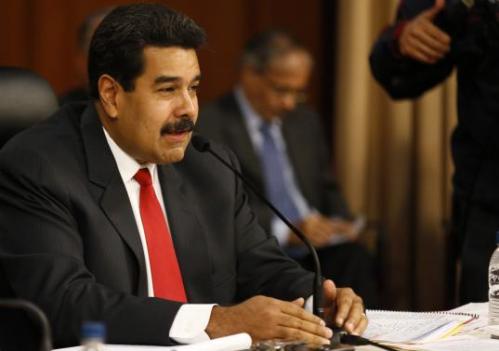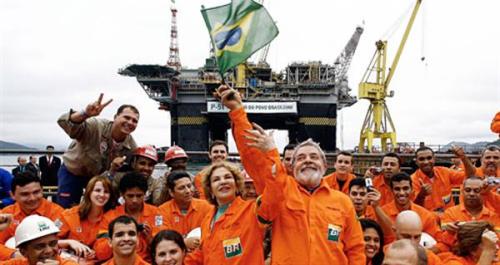Bolivarian Venezuela in crisis: An oil-rich nation collapses? – Panel Discussion (bios follow):
- Ms. Rita Bitar Deeb PhD student in Political Science at the Otto-Suhr-Institut of Freie Universität Berlin
- Dr. Ivo Hernandez Lecturer in International Relations at the Political Science Institute of Universität Münster
- Dr. Manuel Silva-Ferrer John Boulton Foundation Fellow and Lecturer at the Latin-American Institute of Freie Universität Berlin
- Dr. Thomas W. O’Donnell -Moderator Guest Lecturer at Hertie School of Governance and the European Studies Program, FU/BEST at Freie Universität Berlin
WHEN: 10 October, 6-7:30 pm. LOCATION: Hertie School of Governance, Friedrichstrasse 180 – 10117 Berlin, Germany. [To attend, please register online.] – Venezuela is currently unable to adequately feed its people, or to provide basic services such as medical care, education, and electricity. Polls indicate about 90% of the population would vote to remove its Chavista president, Nicolas Maduro, if his government allowed a recall referenda to take place this year, which is widely demanded. What will happen in Venezuela: Collapse? Chaos? Democratic renewal? And, moreover, why is this occurring now?
Since the mid-20th Century, fueled by oil riches, Venezuela has veered from being the leading example of ‘democratic development’ within a continent rife with right-wing dictatorships, to a nation mired in its own economic and political crises. A ‘neo-liberal shock’ in the late-1980’s failed and was roundly rejected by citizens. At the end of the 1990‘s, Hugo Chavez broadly excited the hopes for development of not only Venezuelans but elicited significant sympathy worldwide with Chavismo’s ‘new resource nationalism’ and ’21st Century Bolivarian Socialism’. However, this leftward turn is also demonstrably failing, with the nation again on the brink of disaster. What comes next? Our panel of Venezuelan experts weighs in and will address attendees’ questions.

Rita Bitar Deeb is a PhD student in Political Science at the Otto-Suhr-Institut of the Freie Universität Berlin. She received her Master in Public Policy and Management from the University of Pittsburgh and Graduate Certificate in Latin American Studies. Her research interests are democratization process, social development and gender policy. She has worked for the Inter-American Development Bank (IADB), and several local NGOs as project coordinator in Venezuela (Atenea, Súmate, Red de Apoyo-HHRR). Bitar has taught at the University of Kassel in Germany, and at the Catholic University in Caracas.

Ivo Hernandez is lecturer in International Relations at the Political Science Institute of Universität Münster. He studied at Universidad Central de Venezuela (UCV) in Caracas, the London School of Economics (LSE), the University of Heidelberg and University of Tübingen in Germany and The National Defense University in Washington D.C. His research interests include oil politics, national oil companies, the logics of terrorism, and Latin American politics and political economy.

Manuel Silva-Ferrer is John Boulton Foundation Fellow – exploring oil, society and culture in 20th-Century Latin America – as well as Lecturer at the Latin-American Institute of Freie Universität Berlin. Born in Caracas, he is a graduate of the Institute of Communication Studies at Universidad Central de Venezuela (UCV) and earned his PhD from Freie Universität Berlin. He was Director of the state film foundation Cinemateca Nacional de Venezuela and Head of Cinema and Media at the Ministry of Culture where his work included developing the National Academy of Film and Audiovisual. Silva-Ferrer led ExtraCámara, a magazine for Latin-American photography, and was co-responsible for the creation of the Centro Nacional de la Fotografía, a public foundation for the promotion of photographic art. During his studies, Silva-Ferrer was Fellow of the Fundación Gran Mariscal de Ayacucho, and awarded a PhD full scholarship from the German Academic Exchange Service (DAAD).

Moderation & comments:
Thomas W. O’Donnell is Guest Lecturer at Hertie School of Governance and the European Studies Program (FU/BEST) at Freie Universität Berlin. An academic, analyst and consultant in the global energy system and international relations, his work has encompassed especially the role of oil and gas in the EU, Russia, Latin America, Middle East, China and the USA. His PhD is from the University of Michigan at Ann Arbor in experimental nuclear physics, and he previously studied Political Science and China Studies at the State University of New York and Canisius College. In 2008-09, he was US Fulbright Scholar and Visiting Professor at the Center for the Study of Development (CENDES) at the Central University of Venezuela (UCV) and in 2015 AICGS (American Institute of Contemporary German Studies) & DAAD Fellow in Washington D.C. O’Donnell has taught post-graduate seminars on energy in international relations and development at The University of Michigan, The Ohio State University, The New School University’s JJ Studley Graduate Program in International Affairs (NYC),and Freie Universität, JFK Institute (Berlin). He is Senior Analyst at Wikistrat and consults with other geopolitical and business-intelligence firms. Before his PhD, O’Donnell gained broad tech experience in U.S. automobile-manufacturing, railway-operations and power-generation industries. He is author of some 40 peer-reviewed scientific physics papers.








 Back in April, Brazil’s Folha de SaoPaulo ran an article entitled: “
Back in April, Brazil’s Folha de SaoPaulo ran an article entitled: “

